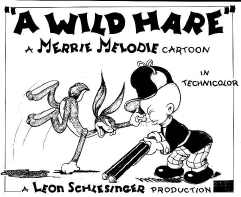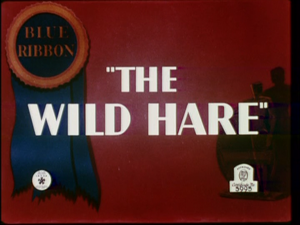Difference between revisions of "A Wild Hare"
JamesIsHere (talk | contribs) |
|||
| Line 1: | Line 1: | ||
{{DISPLAYTITLE:A Wild Hare''}} | |||
{{Infobox movie | {{Infobox movie | ||
|image= [[File:A Wild Hare Lobby Card.png|300px]] | |image= [[File:A Wild Hare Lobby Card.png|300px]] | ||
|caption= Lobby | |caption= Lobby card. | ||
|prodcompany= [[Warner Bros. Cartoons]] | |prodcompany= [[Warner Bros. Cartoons]] | ||
|distributor= [[Warner Bros. Pictures]]<br />[[The Vitaphone Corporation]] | |distributor= [[Warner Bros. Pictures]]<br />[[The Vitaphone Corporation]] | ||
|released= [[July 27]], [[1940]] | |released= [[July 27]], [[1940]] | ||
|run_time= 8:15 | |run_time= 8:15 | ||
|starring= [[Mel Blanc]] | |starring= [[Mel Blanc]]<br />[[Arthur Q. Bryan]] | ||
|music= [[Carl Stalling]] | |music= [[Carl W. Stalling]] | ||
|story= [[Rich Hogan]] | |story= [[Rich Hogan]] | ||
|director= [[Tex Avery]] | |director= [[Tex Avery]] | ||
| Line 16: | Line 17: | ||
|title_card= [[File:A wild hare title card.png|300px]] | |title_card= [[File:A wild hare title card.png|300px]] | ||
|title_card2= [[File:A Wild Hare Blue Ribbon Title Card.png|300px]] | |title_card2= [[File:A Wild Hare Blue Ribbon Title Card.png|300px]] | ||
|caption2= Blue Ribbon reissue. | |||
}} | }} | ||
'''A Wild Hare''' is | '''''A Wild Hare''''' is the hundred and fifty-fourth ''[[Merrie Melodies]]'' theatrical short. It was distributed by [[Warner Bros. Pictures]] and [[The Vitaphone Corporation]] on [[March 2]], [[1940]]. It was written by [[Rich Hogan]], animated by [[Virgil Ross]], produced by [[Leon Schlesinger]], and directed by [[Charles Jones]]. | ||
Elmer encounters a mischievous rabbit while hunting. | Elmer encounters a mischievous rabbit while hunting. | ||
| Line 42: | Line 44: | ||
|style="background-color:#clear"| [[Arthur Q. Bryan]] | |style="background-color:#clear"| [[Arthur Q. Bryan]] | ||
|- | |- | ||
|style="background-color:# | |style="background-color:#clear"| [[Bugs Bunny]] | ||
|style="background-color:# | |style="background-color:#clear"| [[Mel Blanc]] | ||
|- | |||
|style="background-color:#FDB56C" colspan="2"| [[Hedy Lamarr]] | |||
|- | |||
|style="background-color:#FDB56C" colspan="2"| [[Carole Lombard]] | |||
|- | |||
|style="background-color:#FDB56C" colspan="2"| [[Rosemary Lane]] | |||
|- | |||
|style="background-color:#FDB56C" colspan="2"| [[Olivia de Havilland]] | |||
|- | |||
|style="background-color:#d2d2ff"| Skunk | |||
|style="background-color:#aaffaa"| Mel Blanc | |||
|- | |- | ||
{{CastBottom}} | {{CastBottom}} | ||
| Line 50: | Line 63: | ||
* [[Earth]] | * [[Earth]] | ||
** [[United States]] | ** [[United States]] | ||
*** | *** Forest | ||
**** [[Bugs's residence]] | |||
==Objects== | ==Objects== | ||
| Line 59: | Line 73: | ||
===Filming=== | ===Filming=== | ||
==Music== | ==Music== | ||
The music was composed by [[Carl Stalling]]. | The music was composed by [[Carl W. Stalling]]. | ||
In instrumental form, "The Fountain in the Park" plays when a hidden Bugs uses his two fingers to search for the carrot. | |||
==Release== | ==Release== | ||
| Line 67: | Line 83: | ||
==Behind the scenes== | ==Behind the scenes== | ||
* This is the first ever appearance of Bugs Bunny, although a prototype of the character | * This is the first ever appearance of Bugs Bunny, although a prototype of the character had appeared several times before, beginning with ''[[Porky's Hare Hunt]]''. | ||
** Bugs' catchphrase, "What's up, doc?", also makes its debut. It was written by Tex Avery, who later explained that it was | ** Bugs' catchphrase, "What's up, doc?", also makes its debut. It was written by Tex Avery, who later explained that it was a common expression used in his native home state of Texas.<ref>Adamson, Joe (1975). ''Tex Avery: King of Cartoons.'' New York City: Da Capo Press. ISBN 0-306-80248-1.</ref> | ||
==Errors== | ==Errors== | ||
* | * | ||
==Everlasting Influence== | ==Everlasting Influence== | ||
* While Bugs is unnamed in this short, he would be given his iconic name in the next short to feature him | * While Bugs is unnamed in this short, he would be given his iconic name in the next short to feature him, ''[[Elmer's Pet Rabbit]]''. | ||
==Critical reception== | ==Critical reception== | ||
| Line 89: | Line 106: | ||
==Home availability== | ==Home availability== | ||
* | * In the United States: | ||
** | |||
==References== | ==References== | ||
[[Category: | <references/> | ||
{{DEFAULTSORT:Wild Hare, A}} | |||
[[Category:1940]] | |||
[[Category:Bugs Bunny theatrical shorts]] | |||
[[Category:Directed by Chuck Jones]] | |||
[[Category:Elmer Fudd theatrical shorts]] | |||
[[Category:Merrie Melodies]] | |||
[[Category:Theatrical shorts]] | |||
[[Category:Warner Bros. Cartoons]] | |||
Revision as of 12:29, 25 November 2023
| A Wild Hare | |
|---|---|
 Lobby card. | |
| Production company | Warner Bros. Cartoons |
| Distributor | Warner Bros. Pictures The Vitaphone Corporation |
| Release date | July 27, 1940 |
| Run time | 8:15 |
| Starring | Mel Blanc Arthur Q. Bryan |
| Music composed by | Carl W. Stalling |
| Story by | Rich Hogan |
| Director(s) | Tex Avery |
| Animation director(s) | Tex Avery |
| Art director(s) | Tex Avery |
| Series navigation | |
| ← Previous | Next → |
| Title card | |
| File:A wild hare title card.png | |
| Second title card | |

| |
A Wild Hare is the hundred and fifty-fourth Merrie Melodies theatrical short. It was distributed by Warner Bros. Pictures and The Vitaphone Corporation on March 2, 1940. It was written by Rich Hogan, animated by Virgil Ross, produced by Leon Schlesinger, and directed by Charles Jones.
Elmer encounters a mischievous rabbit while hunting.
Detailed summary
Memorable quotes
Elmer: Shh... Be vewy, vewy quiet. I'm hunting wabbits!
Bugs: What's up, Doc?
Elmer: Shh! Thewe's a wabbit down thewe, and I'm twying to catch him.
Elmer: Pawdon me, but you wook just wike a wabbit!
Bugs: C'mere... Listen, Doc. Now, don't spread dis around, but, um... confidentially... I AM A RABBIT!!!
Bugs: Can ya imagine anybody actin' like dat? Y'know, I think da poor guy's screwy!
Characters
In order of appearance: | ||||||||||||||||
| ||||||||||||||||
Locations
- Earth
- United States
- Forest
- United States
Objects
- Elmer's rifle
Production
Development
Filming
Music
The music was composed by Carl W. Stalling.
In instrumental form, "The Fountain in the Park" plays when a hidden Bugs uses his two fingers to search for the carrot.
Release
Dates are in order of release:
- United States: July 27, 1940 in theatres
Behind the scenes
- This is the first ever appearance of Bugs Bunny, although a prototype of the character had appeared several times before, beginning with Porky's Hare Hunt.
- Bugs' catchphrase, "What's up, doc?", also makes its debut. It was written by Tex Avery, who later explained that it was a common expression used in his native home state of Texas.[1]
Errors
Everlasting Influence
- While Bugs is unnamed in this short, he would be given his iconic name in the next short to feature him, Elmer's Pet Rabbit.
Critical reception
In other languages
| Language | Name | Meaning |
|---|---|---|
Home availability
- In the United States:
References
- ↑ Adamson, Joe (1975). Tex Avery: King of Cartoons. New York City: Da Capo Press. ISBN 0-306-80248-1.